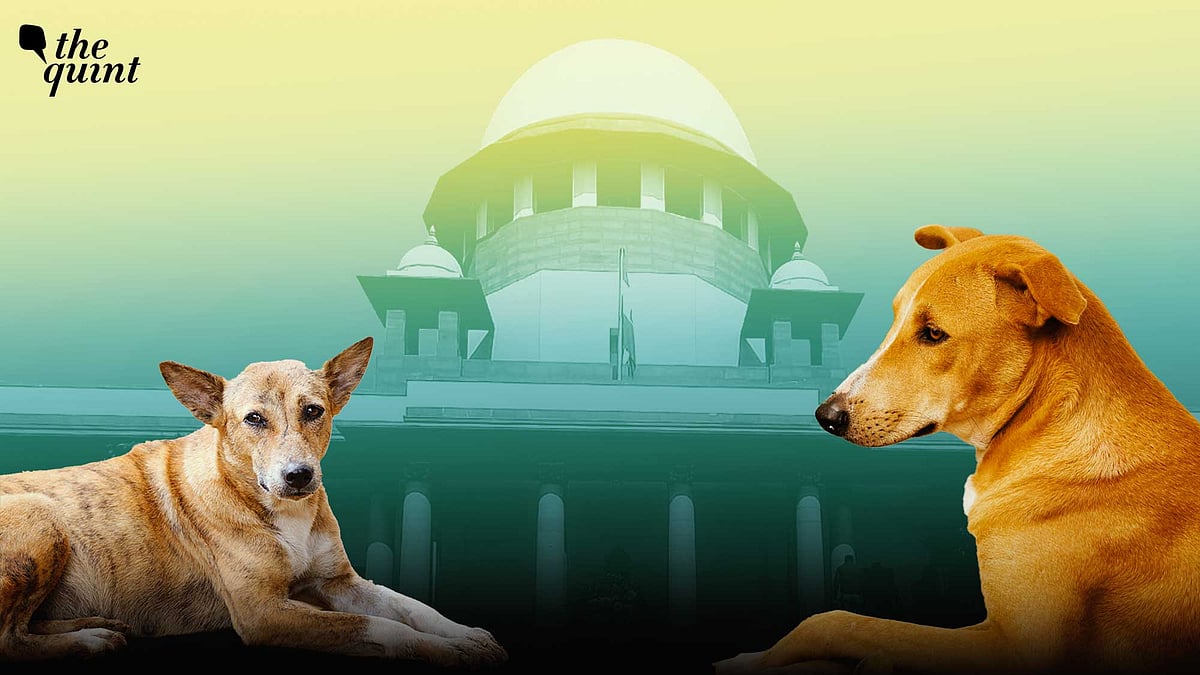Supreme Court’s Street Dog Ruling Is a Recipe for Cruelty
The CJI should immediately stay this order and frame a long-lasting doable plan in consultation with stakeholders.

advertisement
(Amid the ongoing suo motu proceedings to evolve a national policy on stray dog management, the Supreme Court on 7 November 2025 ordered the removal of stray dogs from educational institutions, hospitals, bus stands, sports complexes, and railway stations, and sent to designated dog shelters. This story was first published on 12 Aug 2025 and is being republished in light of the recent development.)
Based on suo motu case of increasing episodes of dog bites in the national capital region, the Supreme Court this week directed the Delhi government and local bodies in NCR to capture stray dogs and permanently house them in shelters on urgent basis.
The bench of Justices JB Pardiwala and R Mahadevan ordered the authorities to keep them in pounds. Anyone resisting the arrest of canines would be held for contempt of court and legal action.
It instructed officials from the NCT government, MCD, and NDMC to construct dog shelters for at least 5,000 stray dogs within six to eight weeks to put a lid on the growing menace of stray dogs.
The directives are insensitive towards indigenous dogs, against animal rights discourse, in dissonance with Article 51A (g) of Indian constitution and utter disregard for Animal Birth Control (Dogs) Rules, 2001 (ABC) framed under the ambit of Prevention of Cruelty to Animals.
The bench during the proceedings referred to a 1966 Hollywood film, The Good, the Bad and the Ugly, which will serve as the template for analysing the authoritarian and undemocratic directive that would peril the lives of hundreds of street dogs living in public places.
The Good
The good part of the order was that it brought to forefront the jurisprudential brilliance of Justice JB Pardiwala, who would be the next CJI. He gave the example of a movie from Wild West propagating killings by for justice. He said:
This reflects his likings for 19-century gun violence movies and instant justice bereft of respect for judicial laws and legal precedents. He has a penchant for courting controversies, like passing of anti-reservation remarks in a 2015 sedition case that invited a parliamentary motion for removal from HC judgeship, forcing him to expunge the offensive comments and the recent reprimand of an Allahabad HC judge and retraction.
The Bad
The bad part of the directive is that fails to delve into the history of the stray dogs, popularly known as ‘Pariah dog’, receiving it name after the Pariah tribe of Madras Presidency during the British rule. The cave paintings in the Indian subcontinent and archaeological excavations from Mohenjo-Daro site (2500 BCE) provides evidence that it as one of the oldest canine dog breeds in the world.
In the Hindu epic Mahabharata, as Yudhisthira, the eldest of the Pandava brothers reached the gates of heaven followed by a dog, Lord Indra invited him to paradise with the provision that he leaves the dog behind. Yudhisthira replied, ‘Great king of the gods, it is not possible for a noble person to do such a dishonourable deed, and hence I do not want glory by abandoning one who is devoted to me’. The dog revealed his true self as god Dharma, praised him for intelligence, morality and compassion and admitted him to heaven.
The order is not only anti-religious, but also objectifies street dogs and does not accept it as ‘sentient beings’.
The directive will give wings to neo community of dog haters, who would take laws in their hands to commit hate crimes against non-pet dogs and amplify anti-canine vigilantism.
The Ugly
The ugly part would be the implementation of the SC directive that is reminiscent of transfer of capital from Delhi to Daulatabad in south India by Muhammad bin Tughluq, the Sultan of Delhi in 1327.
The forced human migration was a disaster, as it caused immense suffering and large number of deaths due to hardship and disease, and was a reversed a few years later due to total failure.
The relocation of dogs from their place of birth would not only cause severe trauma and depression, but also premature death and destruction.
The CJI of Supreme Court should immediately intervene, stay this order, and frame a long-lasting doable plan in consultation with all the stakeholders or else citizens will lose in faith in the last standing democratic institution in the country.
Mahatma Gandhi had said "The greatness of a nation and its moral progress can be judged by the way its animals are treated." The rampant ill treatment of animals, Indian dogs in particular, in contemporary India reveals that the country needs to walk the extra mile if it aims to attain the goal of Viksit Bharat at 2047.
(With valuable inputs from Baiju Sanyal, an animal caregiver based in NOIDA, Uttar Pradesh).
(Praveen Rai is a Political Analyst at the Centre for the Study of Developing Societies, Delhi. This is an opinion piece and the views expressed above are the author's. The Quint is neither responsible nor endorses them.)